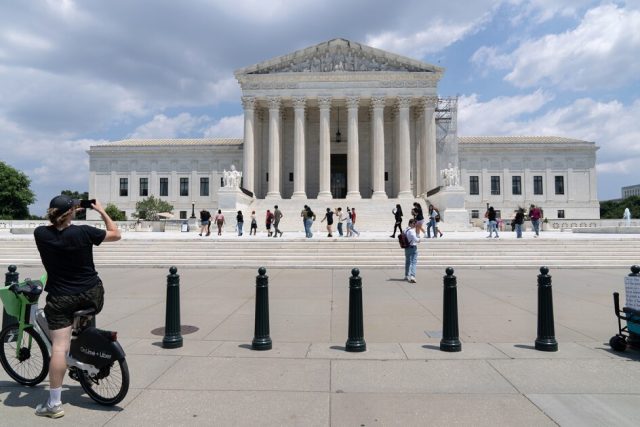[ad_1]
The U.S. Supreme Court has declined to take up cases about a state constitutional provision barring aid to religious schools and the 2021 controversy about parent protests at school board meetings.
As the justices opened their new term Oct. 7, they turned away hundreds of petitions for review that had piled up over their summer recess. The court has important cases of interest to educators on its docket, including about transgender rights and the federal E-rate program for schools. And they may yet take up other cases on gender identity in schools and state aid to religion.
But here are the two notable cases they declined.
Supreme Court declines Michigan case on aid to religious schools
The court denied review in Hile v. Michigan, a case about that state’s bar on aid to religious schools, on the same day that two appeals were filed involving a more high-profile religion case—the effort in Oklahoma to create a state-funded Roman Catholic charter school.
Parents and advocacy groups in the Michigan case, buoyed by the Supreme Court’s recent rulings bolstering the inclusion of religious schools in certain state aid programs, challenged that state’s 1970 state constitutional amendment barring direct or indirect aid to all nonpublic schools. The U.S. Court of Appeals for the 6th Circuit, in Cincinnati, ruled that the constitutional provision does not discriminate against religious schools or parents because it neutrally applies to secular private schools as well and is a “legitimate policy choice.”
In their appeal to the high court, religious school parents in Michigan said the state’s constitutional provision has an “anti-religious purpose” and that Michigan’s “workaround” of a neutral ban on all aid to nonpublic schools “will become the loophole through which many states discriminate against religious families and individuals.”
Some advocates supporting the Oklahoma religious charter school hoped that the court would take up the Michigan case or at least hold off on any action on it until it decided whether to grant review in the Oklahoma case.
Appeals of the Oklahoma supreme court ruling in June against the proposed Roman Catholic charter school were expected to be filed by the end of the day on Oct. 7.
Attorney general’s memo on protests against school boards created a firestorm
The high court also declined to revive a lawsuit stemming from the infamous 2021 incident in which U.S. Attorney General Merrick Garland issued a memorandum about “a disturbing spike in harassment, intimidation and threats of violence” against school administrators and school boards, especially at public board meetings.
The memo led some groups to charge that vast federal resources were being unleashed to discourage parents from speaking out about school policies they opposed. (Two such groups just filed a new report on the matter that highlights their assertions.)
Conservative groups say Garland’s memo was prompted by a letter from the National School Boards Association to the White House that referred to school board protestors as engaged in “a form of domestic terrorism.”
Garland’s Oct. 4, 2021, memo said that “while spirited debate about policy matters is protected under our Constitution, that protection does not extend to threats of violence or efforts to intimidate individuals based on their views.”
The memo instructed the FBI to meet with local leaders to address such threats. There was a major backlash against the Garland memo, and the NSBA lost members over its own letter despite issuing an apology and commissioning an independent review.
Some parents and an informal group in Saline, Mich., and Loudoun County, Va., who had engaged in school board protests sued Garland, alleging that his memo had created a policy that violated their free speech rights and caused them “reputational harm.”
Both a federal district court and the U.S. Court of Appeals for the District of Columbia Circuit ruled against the lawsuit. The appeals court held that the Garland memo announced initial plans by the Department of Justice “to investigate and strategize internally” and thus “does not threaten imminent legal action against anyone, and certainly not against [the parents].”
The court further explained “even on a generous reading” of the complaint, the parents “have not offered anything to show that the government labeled them in any way, let alone impugned their reputations.”
In their Supreme Court appeal in Saline Parents v. Garland, the parents argued that the facts supported a “narrative of a rogue policy designed to intimidate and silence parent protestors at school board meetings. This case presents important questions involving the right of private citizens to be free from government investigations and surveillance designed to chill their right to freedom of speech.”
In denying review of both cases, the justices offered no comments or dissents.
[ad_2]
Source link











